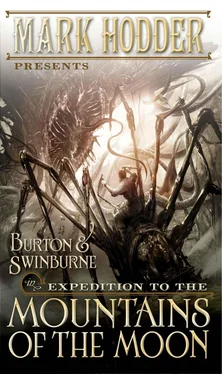Mark Hodder - Expedition to the Mountains of the Moon
Здесь есть возможность читать онлайн «Mark Hodder - Expedition to the Mountains of the Moon» весь текст электронной книги совершенно бесплатно (целиком полную версию без сокращений). В некоторых случаях можно слушать аудио, скачать через торрент в формате fb2 и присутствует краткое содержание. Жанр: sf_stimpank, на английском языке. Описание произведения, (предисловие) а так же отзывы посетителей доступны на портале библиотеки ЛибКат.
- Название:Expedition to the Mountains of the Moon
- Автор:
- Жанр:
- Год:неизвестен
- ISBN:нет данных
- Рейтинг книги:5 / 5. Голосов: 1
-
Избранное:Добавить в избранное
- Отзывы:
-
Ваша оценка:
- 100
- 1
- 2
- 3
- 4
- 5
Expedition to the Mountains of the Moon: краткое содержание, описание и аннотация
Предлагаем к чтению аннотацию, описание, краткое содержание или предисловие (зависит от того, что написал сам автор книги «Expedition to the Mountains of the Moon»). Если вы не нашли необходимую информацию о книге — напишите в комментариях, мы постараемся отыскать её.
Expedition to the Mountains of the Moon — читать онлайн бесплатно полную книгу (весь текст) целиком
Ниже представлен текст книги, разбитый по страницам. Система сохранения места последней прочитанной страницы, позволяет с удобством читать онлайн бесплатно книгу «Expedition to the Mountains of the Moon», без необходимости каждый раз заново искать на чём Вы остановились. Поставьте закладку, и сможете в любой момент перейти на страницу, на которой закончили чтение.
Интервал:
Закладка:
“Do you still imagine that, as my husband, you would have been in a position to command me? If so, I must disillusion you. Besides which, you are not my husband, and I take orders from no one. If I see fit to lead my women alongside your expedition, what can you do to stop me?”
“Nothing.”
“Then our conversation is done.”
With that, Isabel dropped her cigarette, crushed it beneath her heel, and paced away.
The Elphinstone manoeuvred through sharp coral reefs and steered toward a white Arabic town dominated by a plain square fort, which rose from among the clove shrubs, the coco-trees, and the tall luxuriant palms. Though the sun was high in the azure sky, the light it cast over the settlement was hazy and mellow, perhaps an effect of the high humidity, making the place appear beautiful in the extreme. However, twenty minutes later, when the steamer glided past the guard ship and into the mirror-smooth harbour waters where the rank stench of rotting molluscs and copra became overwhelming, the illusion broke. The idyllic landscape, seen up close, proved anything but. The shoreline was marked by a thick line of refuse, including three bloated human corpses upon which cur dogs were chewing, and the buildings were revealed to be in dire need of renovation.
Small fishing vessels now swarmed around the arriving sloop, and from them men shouted greetings and questions, and requested gifts, and demanded bakhshish , and offered fish and tobacco and alcohol at exorbitant prices. They were a mix of many races; those with the blackest skin wore wide-brimmed straw hats, while those of a browner cast wore the Arabic fez. Their clothing was otherwise the same: the colourful cotton robes common to so much of Africa.
Burton watched the familiar details unfold and thought, I no longer feel that I don't belong.
He'd been reflecting upon that statement ever since he'd made it. Now, while deck hands milled around making preparations to secure the vessel, it occurred to him that he hadn't adapted himself to British society at all-rather, British society was changing at such a pace, and with so little planning and forethought, that it had become extremely volatile, and, while this precarious state caused most of its people to feel unsettled, for some reason Burton couldn't comprehend, it was an environment he practically relished.
He stretched, turned, and walked over to Swinburne, Trounce, and Krishnamurthy.
Trounce grumbled, “It's not quite the paradise I expected, Richard.”
Burton examined the flat-roofed residences, the Imam's palace, and the smart-looking consulates. Beyond them, and ill-concealed by them, the decrepit hovels of the inner town slumped in a mouldy heap.
“Zanzibar city, to become picturesque or pleasing,” he said, “must be viewed, like Stanbul, from afar.”
“And even then,” Swinburne added, “with a peg firmly affixed to one's nose.”
The ship's anchors dropped, and, with gulls and gannets wheeling and shrieking overhead, she came to a stop in the bay, nestling among the dhows and half a dozen square-rigged merchantmen. The British collier ship Blackburn was also there, waiting forlornly for the Orpheus.
As tradition demanded, the Elphinstone loosed a twenty-one-gun salute, and the detonations momentarily silenced the seabirds before rolling away into the distance. Strangely, no response came, either in the form of raised bunting or returned cannon fire.
“That's a curious omission. I wonder what's happening,” Burton muttered. He turned to his friends and said, “The captain will order a boat lowered soon. Let's get ourselves ashore.”
They had spent seven weeks in the Arabian Desert, two weeks in Aden, and ten days at sea. The expedition was considerably behind schedule. It was now the 19th of March.
Time to disembark.
Time to set foot on African soil.
Burton, Swinburne, Trounce, Honesty, and Krishnamurthy were met at the dock by a half-caste Arab who placed his hand over his heart, bowed, and introduced himself, in the Kiswahili tongue, as Said bin Salim el Lamki, el Hinawi. He was of a short, thin, and delicate build, with scant mustachios and a weak beard. His skin was yellowish brown, his nose long, and his teeth dyed bright crimson by his habitual chewing of betel. His manner was extremely polite. He said, “Draw near, Englishmen. I am wazir to His Royal Highness Prince Sayyid Majid bin Said Al-Busaid, Imam of Muscat and Sultan of Zanzibar, may Allah bless him and speed his recovery.”
Burton answered, in the same language: “We met when I was here last, some six years ago. Thou wert of great help to me then.”
“I was honoured, Sir Richard, and am more so that thou doth remember me. I would assist thee again, and will begin by advising thee to accompany me to the palace before thou visit the consulate.”
“Is there a problem?”
“Aye, there may be, but I should leave it for Prince Sayyid to explain. He is looking forward to seeing thee.”
Eight men had accompanied Said. They were Askaris-a title created some years ago by the prince's grandfather, Sultan bin Hamid, to distinguish those Africans who took military service with him. Through means of immoderately wielded staffs, they now kept the hordes of onlookers, beggars, and merchants away from the group as it moved into the town.
“His Highness has been ill?” Burton enquired.
“With smallpox,” Said answered. “But by Allah's grace, the worst of it has passed.”
They entered a deep and winding alley, one of the hundreds of capricious and disorderly lanes that threaded through the town like a tangled skein. Some of the bigger streets were provided with gutters, but most were not, and the ground was liberally puddled with festering impurities, heaps of offal, and the rubble of collapsed walls. Naked children played in this filth, poultry and dogs roamed freely through it, and donkeys and cattle splashed it up the sides of the buildings to either side.
The fetor given off by the streets, mingled with the ubiquitous odour of rotting fish and copra, made the air almost unbreathable for the visitors. All of them walked with handkerchiefs pressed against their noses.
Their eyes, too, were assaulted.
Initially, it was the architecture that befuddled Burton's companions, for they had seen nothing like it before. Built from coral-rag cemented with lime, the masonry of the shuttered dwellings and public establishments to either side of the alleys showed not a single straight line, no two of their arches were the same, and the buildings were so irregular in their placement that the spaces between them were sometimes so wide as to not look like thoroughfares at all, and often so narrow that they could barely be navigated.
Slips of paper, upon which sentences from the Koran had been scribbled, were pinned over every doorway.
“What are they for?” Krishnamurthy asked.
“To ward off witchcraft,” Burton revealed.
As for the inhabitants of Zanzibar, they appeared a confusing and noisy melange of Africans and Arabs, Chinamen and Indians. The Britishers saw among them sailors and market traders and day labourers and hawkers and date-gleaners and fishermen and idlers. They saw rich men and poor men. They saw cripples and beggars and prostitutes and thieves.
And they saw slaves.
Swinburne was the first to witness the island's most notorious industry. As he and his friends were escorted through the crowded and chaotic Salt Bazaar-thick with musky, spicy scents, and where Said's men swung their staffs with even less restraint-the little poet let out a terrific yell of indignation. Burton, following his assistant's shocked stare, saw a chain gang of slaves being driven forward by the whip, approaching them through the crowd to the right.
Читать дальшеИнтервал:
Закладка:
Похожие книги на «Expedition to the Mountains of the Moon»
Представляем Вашему вниманию похожие книги на «Expedition to the Mountains of the Moon» списком для выбора. Мы отобрали схожую по названию и смыслу литературу в надежде предоставить читателям больше вариантов отыскать новые, интересные, ещё непрочитанные произведения.
Обсуждение, отзывы о книге «Expedition to the Mountains of the Moon» и просто собственные мнения читателей. Оставьте ваши комментарии, напишите, что Вы думаете о произведении, его смысле или главных героях. Укажите что конкретно понравилось, а что нет, и почему Вы так считаете.












